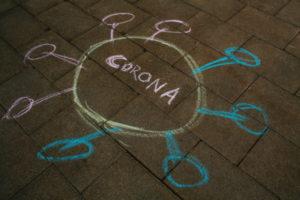 During our current pandemic, people seem to crave timely and accurate information more than usual. We want to know how to protect our families and ourselves, we want to understand how a virus actually works, we want to know what will happen. That last one is especially evasive: the virus is new, so we can’t be sure how it will behave; we haven’t lived through a pandemic before; and we haven’t faced a major crisis under our current president. We want to keep up. It feels life or death, and bad information – let’s pack the churches on Easter! It’ll be fine! – tilts toward death.
During our current pandemic, people seem to crave timely and accurate information more than usual. We want to know how to protect our families and ourselves, we want to understand how a virus actually works, we want to know what will happen. That last one is especially evasive: the virus is new, so we can’t be sure how it will behave; we haven’t lived through a pandemic before; and we haven’t faced a major crisis under our current president. We want to keep up. It feels life or death, and bad information – let’s pack the churches on Easter! It’ll be fine! – tilts toward death.
I spend too much time scrolling through Twitter and refreshing the front pages of the newspapers I subscribe to, then feeling overwhelmed and sad and angry. It’s just too much information, too many judgements I have to make about whether something is important or trustworthy or merely speculation. It’s just too difficult to put every outrage and every personal story of disaster into perspective. Every chart full of colored curved lines that reports on whether we’re flattening the curve or not seems important, though the charts lie because we don’t have good numbers, because we don’t have tests. We elected people who promised to dismantle our institutions and they are doing a heck of a job. So we sort through information and we share it, looking for certainty in an uncertain world.
Certainty keeps slipping away. We have to work from home for two weeks. Or two months, or maybe longer. It’s only the elderly who will die, and people with chronic illness who get added in as if they are a minor footnote. (Six in ten Americans has at least one chronic illness.) Young people are fine. But wait, they are getting sick and dying after all. Masks are pointless. Well, actually we should wear them, but we don’t have any.
People are turning to traditional news sources more than usual, and trust in science and scientists appears to be growing. Social media platforms are feeling the weight of people’s craving for information, struggling to moderate posts, relying more on AI as their human garbage collectors are furloughed. Facebook and Twitter appear to be blocking misinformation more aggressively without fretting about right-wing claims of bias. Bad information can kill. Good information can help us cope and assist with surveillance of the disease – important during epidemics – but it has to be undertaken with efficacy in mind and have some sort of sunset clause so intrusive surveillance doesn’t become the new normal, as happened after 9/11.
What next? That’s a big, scary question because we can’t know what will happen. But I wonder if any of this craving for quality information will carry over into life when it returns to normal. If it ever returns to normal.
Photo by Markus Spiske